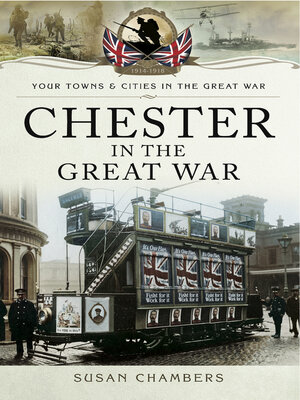
Sign up to save your library
With an OverDrive account, you can save your favorite libraries for at-a-glance information about availability. Find out more about OverDrive accounts.
Find this title in Libby, the library reading app by OverDrive.



Search for a digital library with this title
Title found at these libraries:
| Library Name | Distance |
|---|---|
| Loading... |
An extensively illustrated account of how the residents of this English market town experienced and endured the First World War.
At the outbreak of the Great War, Chester was transformed from a county market town with some nice shops and lots of day-trippers to a bustling, frantically busy military center with men and horses everywhere. As they left for the war zones, or to go to other parts of the country for training, the city settled down to the hard work of dealing with the absence of so many men from vital jobs—a challenge eventually tackled by many of the city's women.
Life was hard and money was short for some, though others earned good wages in the ammunition works. It soon became obvious that many men would never come back. But life in the city went on, everyone played their part, and the cinemas and theaters stayed open as did the pubs (though with reduced hours). Concerts kept the people entertained and helped to raise vital funds, and news films kept them up-to-date with the latest from the front. But, eventually, it was finally over—and the city moved on to dealing with the aftermath.
At the outbreak of the Great War, Chester was transformed from a county market town with some nice shops and lots of day-trippers to a bustling, frantically busy military center with men and horses everywhere. As they left for the war zones, or to go to other parts of the country for training, the city settled down to the hard work of dealing with the absence of so many men from vital jobs—a challenge eventually tackled by many of the city's women.
Life was hard and money was short for some, though others earned good wages in the ammunition works. It soon became obvious that many men would never come back. But life in the city went on, everyone played their part, and the cinemas and theaters stayed open as did the pubs (though with reduced hours). Concerts kept the people entertained and helped to raise vital funds, and news films kept them up-to-date with the latest from the front. But, eventually, it was finally over—and the city moved on to dealing with the aftermath.







